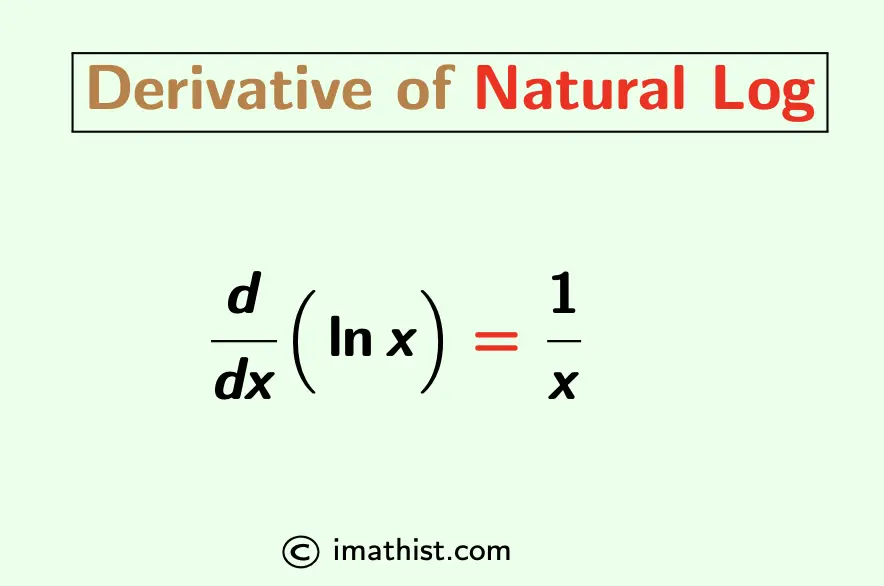The derivative of natural log of x is equal to 1/x. As the natural logarithm of x is denoted by lnx, so the derivative formula of natural log of x is given by
$\dfrac{d}{dx}{\ln x}=\dfrac{1}{x}$.

Find Derivative of Natural log of x
Answer: The derivative of natural log of x is 1/x.
Explanation:
Note the natural log of x is denoted by ln(x) = logex. Let us assume that
y= ln(x) = logex. (we need to find dy/dx)
⇒ ey = x.
Differentiating both sides with respect to x, we get that
ey $\dfrac{dy}{dx}$ = 1
⇒ $\dfrac{dy}{dx} = \dfrac{1}{e^y}$
⇒ $\dfrac{dy}{dx}$ = e-y
⇒ $\dfrac{dy}{dx}$ = e-ln x = $e^{\ln x^{-1}}$
⇒ $\dfrac{dy}{dx}$ = x-1 = 1/x.
So the derivative of natural log of x is equal to 1/x, and this is obtained by the method of implicit differentiation.
More Derivatives: Derivative of ax by first principle
Derivative of esinx by first principle
Derivative of root tanx by first principle
Derivative of sec2x by first principle
Derivative of Natural log of x by First Principle
By first principle, the derivative of f(x) is given by
$\dfrac{d}{dx}$(f(x)) = limh→0 $\dfrac{f(x+h)-f(x)}{h}$.
Put f(x) = ln(x).
So the derivative of ln(x), natural log of x, is given as follows:
$\dfrac{d}{dx}$( ln(x) ) = limh→0 $\dfrac{\ln(x+h)-\ln(x)}{h}$
= limh→0 $\dfrac{\ln(\dfrac{x+h}{x})}{h}$ by the formula: lna -lnb = ln(a/b).
= limh→0 $\dfrac{\ln(1+\frac{h}{x})}{h}$
= $\dfrac{1}{x}$ limh→0 $\dfrac{\ln(1+\frac{h}{x})}{h/x}$
[Let h/x=t, so t→0 as h→0]
= $\dfrac{1}{x}$ limt→0 $\dfrac{\ln(1+t)}{t}$
= $\dfrac{1}{x} \times 1$
= $\dfrac{1}{x}$.
So the derivative of natural log of x by the first principle is equal to 1/x.
Read Also: Derivative of ecosx by first principle
Derivative of $\sqrt{\sin x}$ by first principle
Derivative of $\sqrt{\cos x}$ by first principle
FAQs
Q1: What is the derivative of natural logarithm of x?
Answer: the derivative of ln x [natural log of x] is 1/x, denoted as d/dx (ln x) = 1/x (or) (ln x)’ = 1/x.